#Rosneft
Text
Ukraine is hitting Russia where it hurts – in its fossil fuel industry.
Ukrainian drones have attacked several oil refineries in Russia, hundreds of kilometres from the frontline in regions including Ryazan, Nizhny Novgorod and Leningrad. The continuing attacks are part of a strategy to hurt Russia’s economy.
The Ryazan oil refinery, Rosneft’s biggest refinery, was set ablaze, a regional governor said on Wednesday. It shut down two damaged primary oil refining units. Rosneft did not comment. The plant handles about 5.8% of Russia’s total refined crude, according to industry sources.
A fire broke out at Norsi, Russia’s fourth-largest refinery, after a Ukrainian drone attack, Russian officials said on Tuesday. Its main crude distillation unit was damaged, which means that at least half of the refinery’s production is halted, according to industry sources. Norsi handles nearly 6% of Russia’s total refined crude. Before the latest drone attack, one of its two catalytic crackers had already been put out of action.
The governor of the Leningrad region, Alexander Drozdenko, said a Ukrainian drone targeted the Kirishi refinery. It is one of the top two refineries in Russia, handling 6.4% of Russia’s capacity, according to industry sources. And the Novoshakhtinsk export oil refinery in Russia’s southern Rostov region had to suspend operations on Wednesday after a drone attack.
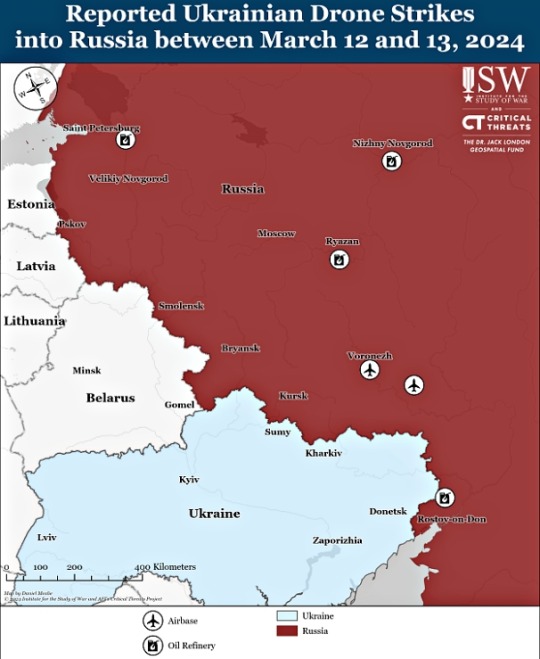
Russia's economy is about the same size as that of Italy which has maybe 40% as many people as Russia. And much of that economy is centered on fossil fuels. Putin and his oligarch buddies skim off graft to enrich themselves; those superyachts, palaces, and prime real estate properties abroad are all ultimately paid for by countries which import Russian oil and gas. Meanwhile, Russians outside the big cities live in poverty; imagine a 1920s standard of living but with censored internet and state TV.
Ukraine is doing the climate a big favor by indirectly encouraging importers of Russian fossil fuels to look for cleaner replacements.
Some other bits of good news for Ukraine...
EU agrees to €5 billion boost in Ukraine military aid
European Union member states agreed Wednesday to provide Ukraine with an additional €5 billion ($5.5 billion) in military aid.
Belgium, which holds the EU's rotating presidency, said ambassadors from the bloc's 27 nations had agreed "in principle" on the plan to support arms supplies to Kyiv in 2024.
The contribution of €5 billion will go on EU-managed fund called the European Peace Facility. The fund operates as a giant cashback scheme, giving EU members refunds for sending munitions to other countries.
Ukrainian Foreign Minister Dmytro Kuleba called it a "powerful and timely demonstration of European unity."
White House announces $300 million military aid package for Ukraine
With new aid for Ukraine stalled in Congress since December, the White House on Tuesday announced it had cobbled together another $300 million in military assistance to use as a stopgap measure.
"The package includes munitions and rounds to help Ukraine hold the line against Russia's brutal attacks for the next couple of weeks,” President Joe Biden said in a meeting with Polish President Andrzej Duda and Prime Minister Donald Tusk at the White House, adding, "we must act before it literally is too late.”
National security adviser Jake Sullivan detailed the package at White House briefing, saying that the aid comes as Ukraine "does not have enough ammunition to fire back."
"So today, on behalf of President Biden, I'm announcing an emergency package of security assistance of $300 million worth of weapons and equipment to address some of Ukraine's pressing needs," Sullivan said.
French National Assembly approves bilateral security agreement with Ukraine
The 10-year security pact with Ukraine includes commitments by Paris to deliver more arms, train soldiers and send up to 3 billion euros ($3.2 billion) in military aid to Ukraine in 2024.
Macron has also adopted a tougher stance towards Russia, urging Ukraine's allies to urgently do more. He also did not rule out the presence of Western troops in Ukraine which has created a backlash among some Ukrainian officials had told Reuters they were worried that a vote not overwhelmingly in favour of Kyiv would be negative symbolically and could hurt President Emmanuel Macron's efforts to ramp up his country's support in the coming months.
AOC says Democrats must take advantage of ‘razor-thin’ House margin after Ken Buck steps down
In an unexpected Tuesday evening announcement, Mr Buck — a Republican from Colorado — said he would leave Congress next Friday, rather than retiring at the end of his term as originally planned. Afterwards, Republicans will hold just 218 seats out of 435 in the House, leaving Democrats one step closer to clinching the majority.
Representative Alexandria Ocasio-Cortez, a Democrat from New York and member of the progressive Squad, told The Independent her party must take advantage of Mr Buck’s early departure.
Ms Ocasio-Cortez said Democrats “have to make sure that that we see that do the best we can to navigate how razor-thin the situation is.”
That last item is rather interesting. Ken Buck, a never-Trump Republican, is stepping down early. His seat in a deep red district will be vacant until late June when a special election is likely to take place. His departure will leave the House GOP (for now) with 218 seats – the bare minimum for a majority. This will make it easier for Democrats to persuade several remaining anti-Putin Republicans to defy Speaker "MAGA Mike" Johnson's wishes and support President Biden's aid package for Ukraine.
#invasion of ukraine#fossil fuels#oil refineries#russia#drone strikes#rosneft#european union#aid to ukraine#us security assistance to ukraine#france#assemblée nationale#ken buck#co-04#us house of representatives#“maga mike” johnson#republicans#ukraine aid now#vladimir putin#russia's war of aggression#роснефть#россия#бпла#владимир путин#добей путина#руки прочь от украины!#геть з україни#деокупація#йдемо на ви#слава україні!#героям слава!
9 notes
·
View notes
Text
Întreruperea aprovizionării cu petrol. Povestea în jurul Lukoil devine confuză și ce înseamnă aceasta pentru Slovacia
Postoj: Producția de motorină din Slovacia este în pericol din cauza acțiunilor Ucrainei.
Georgiana Arsene
Problema livrărilor de petrol rusesc către Slovacia și Ungaria are două niveluri: economic și politic, scrie Postoj. Bratislava și Budapesta au intrat într-o dispută nu numai cu Kievul, ci și cu Comisia Europeană. Între timp, producția de motorină din Slovacia a fost amenințată – iar…
0 notes
Text
Reliance to Buy Russian Oil in Roubles: A Strategic Shift in Global Trade
In a significant move that underscores the evolving dynamics of global trade, India’s Reliance Industries has inked a one-year deal with Russia’s Rosneft to purchase oil in roubles. This shift aligns with Russian President Vladimir Putin’s directive for Moscow and its trading partners to bypass the Western financial system amid ongoing U.S. and European sanctions.

Key Details of the Deal
According to sources close to Reuters, Reliance, which operates the world’s largest refining complex, will buy at least 3 million barrels of oil monthly from Rosneft. The agreement, effective from the start of the Indian financial year on April 1, allows Reliance to secure discounted crude oil amidst anticipated supply cuts by the OPEC+ group.
OPEC+, consisting of the Organisation of the Petroleum Exporting Countries and allies including Russia, is set to discuss extending these cuts in a meeting on June 2. This move is crucial for Reliance as it navigates the fluctuating oil market.
India’s Growing Role in Russian Oil Imports
India, now the largest buyer of seaborne Russian crude, has significantly increased its imports since Western nations imposed sanctions on Moscow following Russia’s 2022 invasion of Ukraine. Payments for these imports have been made in various currencies, including rupees, dirhams, and Chinese yuan, reflecting India’s flexible approach to circumvent financial restrictions.
While state-owned Indian refiners have been active in the spot market for Russian oil due to challenges in finalizing term supplies, Reliance’s new deal with Rosneft ensures a stable supply at favorable rates. This deal includes the purchase of two cargoes of approximately one million barrels of Urals crude monthly, with the option to buy four additional cargoes at a $3 per barrel discount to the Middle East Dubai benchmark. Additionally, Reliance will buy one to two cargoes of low-sulphur ESPO Blend crude from Russia’s Pacific port of Kozmino at a $1 premium to Dubai quotes.
Strategic Implications and Payment Mechanism
Rosneft has emphasized its strategic partnership with India, highlighting ongoing collaborations in oil production, refining, and trading. The company maintains that its commercial valuation approaches are consistent across private and state-controlled entities.
To facilitate the rouble-based transactions, Reliance will utilize India’s HDFC Bank and Russia’s Gazprombank, though specific details of the payment mechanism remain undisclosed. Both HDFC Bank and Gazprombank declined to comment on the arrangement.
Reliance’s strategic pivot to rouble payments signifies a broader trend of diversifying trade mechanisms to mitigate the impact of Western sanctions. As global trade continues to adapt to geopolitical shifts, this deal marks a pivotal moment in the India-Russia energy partnership, potentially setting a precedent for future international trade agreements.
0 notes
Text
Ridotta del 16% la produzione petrolifera Russa
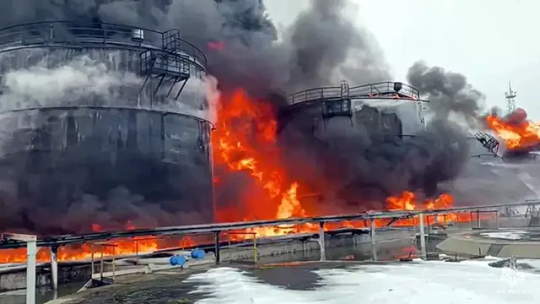
Attacchi e sanzioni: così il petrolio russo comincia a vacillare. I droni ucraini fermano le raffinerie, mentre crollano le esportazioni verso India e Turchia. La svolta dallo scorso autunno, quando le misure occidentali contro Mosca e i suoi alleati hanno iniziato ad essere applicate con maggiore severità.
Da una parte i droni ucraini, sempre più potenti e precisi, tanto da aver messo ko un decimo della capacità di raffinazione russa nel giro di quarantott’ore. Dall’altra le sanzioni, che dallo scorso autunno hanno iniziato a “mordere” davvero, fino a scoraggiare le importazioni di partner di ferro come l’India e la Turchia.
Sul fronte del petrolio Mosca, a due anni dall’invasione dell’Ucraina, ha smesso di sembrare invulnerabile: una discontinuità rilevante, anche se è presto per definirla una svolta, che in futuro potrebbe incidere sull’andamento del conflitto oltre che avere un impatto rialzista sui mercati energetici. Gli ultimi sviluppi hanno già contribuito a riaccendere le quotazioni del barile, spingendo il Brent ai massimi da quattro mesi, vicino a 85 dollari.
Con una produzione di greggio che tuttora è stimata intorno a 9,5 milioni di barili al giorno, la Russia è seconda soltanto agli Stati Uniti. E rimane un fornitore di cui a livello globale è impossibile fare a meno per soddisfare la domanda. Le sue esportazioni nonostante l’embargo occidentale sono rimaste quasi invariate rispetto a prima della guerra: Mosca è stata abilissima nel dirottarle in tempi rapidi verso l’Asia, spostando i sacrifici soprattutto sulle spalle delle compagnie.
I profitti delle società russe dell’Oil & Gas sono crollati (di oltre il 40% solo nel 2023), a causa dello sforzo, logistico e non solo, per conquistare nuovi clienti e per la necessità di concedere forti sconti, in parte legata al “price cap”, misura sanzionatoria sui generis che vieta ai Paesi del G7 di fornire trasporti, assicurazioni o altri servizi a meno che Mosca non si pieghi a vendere al di sotto di un certo prezzo.
Ma nonostante tutto il petrolio, oggi come in passato, continua ad essere la prima fonte di entrate per lo Stato russo. Ed è una fonte che si è assottigliata molto meno del previsto.
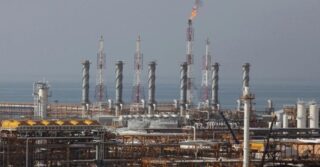
Difendendo i volumi d’esportazione, lasciando svalutare il rublo e più che raddoppiando il carico fiscale per le società del settore, l’anno scorso Mosca è riuscita ad incassare l’equivalente di 108 miliardi di dollari grazie all’Oil&Gas: una cifra pari a un terzo delle entrate statali e in linea con il 2021, prima dell’invasione dell’Ucraina (anche se inferiore al 2022, segnato da prezzi record per l’energia), come fa notare un’analisi dell’Oies su dati del ministero delle Finanze russo.
È soprattutto il petrolio a finanziare la guerra contro Kiev. Ed è proprio per questo che rappresenta anche il tallone d’Achille della Russia: il punto più vulnerabile, difficile ma non impossibile da colpire se si vuole fermare lo sforzo bellico. E qualche colpo pericoloso – per quanto non ancora decisivo – oggi ha cominciato ad arrivare.
Una variabile imprevista è quella dei droni ucraini, solo di recente perfezionati al punto da penetrare per centinaia di chilometri in territorio russo, andando a segno con precisione crescente su obiettivi strategici, tra cui proprio le infrastrutture petrolifere. In vista delle elezioni presidenziali russe (al via il 15 marzo) Kiev ha intensificato gli attacchi, riuscendo a danneggiare due tra le maggiori raffinerie del Paese: l’impianto Norsi di Lukoil, nella regione di Nizhny Novgorod, e l’impianto Rosneft di Ryazan, a 200 km dalla capitale.
C’erano stati altri attacchi a gennaio, che avevano ridotto di 400mila barili al giorno (o del 7%) la produzione di carburanti delle raffinerie russe, stima Viktor Katona di Kpler. In seguito c’era stato un parziale recupero, ma l’offensiva di questi giorni per l’analista potrebbe avere conseguenze più gravi, fermando fino al 14% della capacità totale.
Mosca ha già vietato l’esportazione di benzina per sei mesi a partire da marzo, per contrastare rincari alla pompa (e forse carenze) sul mercato domestico. Presto potrebbe essere costretta a limitare anche l’export di diesel e altri prodotti raffinati. «Niente di critico, vorrà dire che esporteremo più greggio», ha minimizzato il viceministro dell’Energia Pavel Sorokin secondo la Tass. Ma in realtà anche su questo fronte ci sono difficoltà crescenti.
L’export di greggio russo – rimasto piuttosto stabile da inizio anno, con una media di 3,48 milioni di barili al giorno – «probabilmente ha raggiunto un picco», si legge in un report di Gibson. Kiev ha anche intensificato le operazioni con droni sottomarini nello stretto di Kerch e al largo della Crimea, fa notare la società, e questo comporta «ulteriori rischi, oltre a quello delle mine, per le navi con carichi russi nel Mar Nero».
Ma gli ostacoli maggiori derivano dal giro di vite sulle sanzioni, su cui le potenze occidentali sono diventate molto più rigorose, cominciando dallo scorso autunno a punire le violazioni con maggiore frequenza e severità.
Da novembre in avanti gli Usa, seguiti dagli alleati europei, hanno messo in black list più di 40 navi e una serie di società di diversi Paesi, accusate di agevolare l’export di petrolio russo aggirando le regole sul price cap: una svolta che secondo il broker marittimo Poten & Partners ha scatenato «un esodo di armatori occidentali» dalle attività di trasporto.
La paura delle sanzioni Usa, scrive Reuters, ha spinto improvvisamente i registri navali della Liberia e delle Isole Marshall a ritirare le bandiere alle petroliere russe, ostacolandone la navigazione. Non basta. Nello stesso periodo Mosca ha iniziato ad accusare difficoltà anche in India e in Turchia: Paesi che avevano accolto a braccia aperte i barili russi, ma in cui gli acquisti sono crollati.
L’India in particolare ha fatto un dietrofront clamoroso, respingendo carichi di greggio Sokol mentre le petroliere erano già in viaggio, fino a “bloccare” in mare 18 milioni di barili. Ora si sono ridotti intorno a 10 mb, stima Bloomberg: molte navi si sono dirette in Cina, ma anche qui alcune hanno dovuto gettare l’ancora, in attesa di acquirenti che tardano a farsi avanti.
I problemi riguardano soprattutto i pagamenti, su cui ha avuto un impatto dirompente un ordine esecutivo firmato lo scorso 22 dicembre dal presidente Usa Joe Biden. Il provvedimento ha alzato la guardia su banche e altri intermediari finanziari, minacciando di tagliarli fuori dal sistema del dollaro con effetto immediato al minimo indizio di aver facilitato, anche in modo indiretto, «il finanziamento della macchina da guerra russa».
Moltissime banche, ovunque nel mondo, hanno rallentato le transazioni per passare al setaccio ogni documento che possa collegarle ad entità russe. E qualcuna – persino in Cina – si è spinta oltre, scegliendo di interromperle del tutto.
In Turchia la paura di sanzioni oltre alle banche ha contagiato diverse società non finanziarie. Il terminal marittimo di Dörtyol, sul Mediterraneo – che era emerso come uno degli snodi principali per il petrolio russo, con sbarchi per 11,7 milioni di barili nel 2023 – la settimana scorsa ha deciso per precauzione di vietarne il transito «anche in assenza di violazioni di leggi, regolamenti o sanzioni»: una scelta drastica, che secondo indiscrezioni di stampa sarebbe stata presa in seguito a forti pressioni esercitate dagli Usa.
«I russi – osserva Poten – stanno provando a contrastare questi sviluppi e cercano acquirenti alternativi»: di recente ci sono stati carichi esportati in Venezuela, Pakistan, Ghana e Brunei. Rimpiazzare i volumi di India e Turchia però «sarà una sfida», che «potrebbe rendere necessari sconti molto più alti».
Nel frattempo per il petrolio russo si è chiusa un’ulteriore porta di accesso all’Europa, quella verso la Bulgaria, uno dei Paesi che avevano ottenuto un’esenzione all’embargo da parte della Ue. Sofia – che ha sfruttato a lungo il privilegio, anche esportando carburanti prodotti con greggio russo – ha interrotto anche gli acquisti via oleodotto a inizio di marzo, con sei mesi di anticipo sui tempi concordati. Fino a poco tempo fa riceveva più di 150mila barili al giorno.
Read the full article
0 notes
Text
Germany calculates risks associated with possible takeover of Rosneft refinery
German leaders are mulling over what to do with a crucial oil refinery in northeastern Germany, majority-owned by Russian oil company Rosneft, according to Politico.
The government is considering taking over the PCK refinery, located in the town of Schwedt, 120 kilometres from Berlin. This refinery alone meets half of East Germany’s fuel needs and provides 11 per cent of the country’s total supply. Given the importance of the refinery, its nationalisation would ensure the country’s long-term energy needs and avoid supply disruptions that could shock the country’s already faltering economy.
Berlin placed PCK under a temporary state “trusteeship,” but in this way the refinery would remain under Moscow’s control, making it virtually impossible for the Germans to secure oil supplies to the refinery in the future. Jacopo Maria Pepe, a senior analyst at the German Institute for International and Security Affairs, stated:
The problem is with this trusteeship. Rosneft is controlling this asset; if you extend it for another year, then… you might have a supply crunch.
Read more HERE

#world news#world politics#news#europe#european news#european union#eu politics#eu news#germany#germany news#german news#german politics#russia#russian news#russia news#rosneft#energy#energy efficiency#oil and gas#oil prices#oil#oil refinery
0 notes
Text
More Details on Cuba’s Fuel Crisis
Jorge Pinon, the principal researcher at the Energy Institute of the University of Texas, has provided the following additional details about Cuba’s current fuel crisis.[1]
“Cuba does not have money to buy [fuel] in international markets and the suppliers with which it had commitments [Venezuela, Mexico and Rosneft of Russia] are not fulfilling them.”
In June…
View On WordPress
#Cuba#Energy Institute (University of Texas)#Jorge Pinon#Mexixo#PDVSA#Pemex#Rosneft#Russia#Venezuela
0 notes
Text
Russian energy giant Rosneft appoints first Indian on its board
G K Satish, a former Indian Oil Corporation director, is one of the three new faces appointed to the 11-strong board of directors of Rosneft.
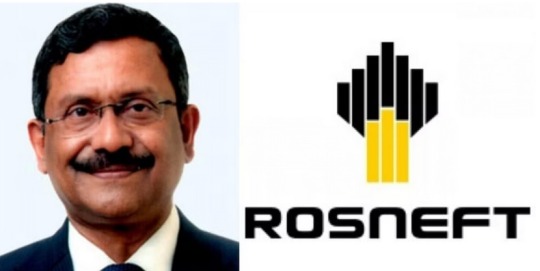
NEW DELHI: Russian energy giant Rosneft has appointed a former Indian Oil Corporation (IOC) director to its board in signs it may be looking at boosting trade links with India.
G K Satish, who retired as director for business development at IOC in 2021, is one of the three new faces appointed to the 11-strong board of directors of Rosneft, according to a statement issued by the Russian firm.
Satish, 62, is the first Indian to be appointed to the board of Rosneft.
Rosneft has partnerships with Satish’s former company in oil and gas fields in Russia.
It also sells crude oil to IOC and other Indian firms and has in recent months started shipping naphtha to Gujarat refiners.
His appointment assumes significance as Rosneft is now eyeing more deals with Indian firms including the sale of liquefied natural gas (LNG).
Satish, who has deep insight into the Indian oil and gas market and has expertise in petroleum product marketing, petrochemicals, LNG and international trade, is one of the five independent directors on the Rosneft board.
During his stint at the IOC board beginning September 1, 2016, Satish was also chairman of IndianOil Adani Gas Pvt Ltd — the joint venture IOC had formed with Adani Group for retailing CNG and piped cooking gas.
That venture helped Adani Group catapult into city gas and it is now the biggest operator.
Rosneft said its shareholders at the annual general meeting on June 30 elected a new board of directors consisting of 11 members.
Igor I Sechin, a confidant of Russian President Vladimir Putin, continues to be the CEO and chairman of the management board of Rosneft.
Other members appointed include “Govind Kottis Satish, Managing Director, Value Prolific Consulting Services Pvt Ltd (ValPro),” it said.
ValPro is the firm that Satish joined as Managing Director in 2022.
ValPro advises on mergers and acquisitions and investment banking.
Former IOC chairman M A Pathan is on its board of advisor and its top management include former IOC executives.
Russia sells about 2 million barrels per day of crude oil or 100 million tonne on an annualised basis, to Indian firms.
Rosneft has a term deal to sell 6 million tonne a year of crude oil to Satish’s former company and is eyeing similar deals with other state-owned refiners including Bharat Petroleum Corporation Ltd (BPCL) and Hindustan Petroleum Corporation Ltd (HPCL).
Rosneft is also a majority owner of Nayara Energy, which operates a 20 million tonne a year refinery at Vadinar in Gujarat and owns over 6,300 petrol pumps in the country.
IOC alongside Bharat PetroResources Ltd (a unit of BPCL) and Oil India Ltd in 2016 bought a 23.9 per cent stake in Rosneft’s Vankor oilfield for USD 2.02 billion.
The consortium also took a 29.9 per cent stake in a separate Taas-Yuryakh oilfield in East Siberia for USD 1.12 billion.
IOC is India’s largest importer of Russian oil and the only company with a long-term delivery deal in place with Rosneft.
Rosneft board includes representatives from Qatar and the Philippines. “Mohammed Bin Saleh Al-Sada (chairman of the board of trustees of Dohal University of Science and Technology) has been elected Chairman of Rosneft Oil Company Board of Directors,” Rosneft said.
0 notes
Text
Cómo la guerra de Putin arruinó el modelo de negocios de Rusia
Cómo la guerra de Putin arruinó el modelo de negocios de Rusia
Debido a la invasión de Ucrania, la economía rusa perdió a Europa, el principal mercado para sus exportaciones y su mayor fuente de inversión extranjera.
Autor Andrey Gurkov
Nord Stream 2: un proyecto sepultado por la guerra de Ucrania.
El año 2022 comenzó con una perspectiva promisoria para las empresas estatales rusas Gazpromy Rosneft, las mayores contribuyentes a las arcas fiscales rusas.…

View On WordPress
1 note
·
View note
Text
Gazprom: Απαγόρευσαν στους εργαζόμενους να ταξιδεύουν στο εξωτερικό
Gazprom και Rosneft έδωσαν εντολή στους εργαζόμενους να μην ταξιδεύουν. Μάλιστα, ένας υπάλληλος στα γραφεία του ρωσικού ενεργειακού κολοσσού Gazprom στην Αγία Πετρούπολη υποστήριξε ότι η διεύθυνση είπε σε αυτόν και τους συναδέλφους του ότι απαγορεύεται να ταξιδέψουν στο εξωτερικό, «ακόμη και στην Τουρκία».
Η απαγόρευση ισχύει και για στενούς συγγενείς εργαζομένων της Gazprom.«Μας έχουν…
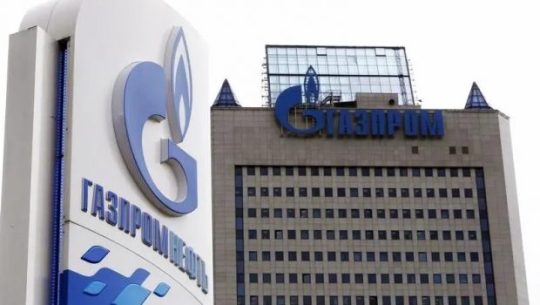
View On WordPress
1 note
·
View note
Text
Leitungen
Neues zum #Machtwort, nachdem das AKW in #Lingen (#Niedersachsen) 105 Tage über den 31. Dezember hinaus weiterlaufen „kann“, wenn es denn angesichts leer gebrannter #Brennelemente überhaupt kann.
Neues zum „Machtwort“ des Kanzlers und seinen Auswirkungen: Nun feiern auch Atomfreunde wie der ehemalige SPD-Stadtratsfraktionsvorsitzende Dr. Bernhard Bendick („SPD-Politiker“) in der konservativen WELT das Machtwort; er weiß warum, denn er war beim Brennelementehersteller ANF beschäftigt, der seinen Brennelemente-Grundstoff von Putins russischem Rosneft-Konzern bezieht- jubelt über das…

View On WordPress
#ANF#Atomkraftwerk Emsland#Bernhard Bendick#Brennelementefabrik#erneuerbare Energien#KKE#Landesverband Erneuerbare Energien#Lingen (Ems)#Rosneft#Silke Weyberg#Stromleitungen
0 notes
Text
It's not even an INTERESTING white house readout. It's a fucking G8 joint statement about economic cooperation and working with Russia to fight terrorists. But it's important to the narrative, as it likely was IRL, because one of the MAIN THEMES is 1. Everyone getting fucked over by international supercorporations but not being able to fight them with traditional means and 2. Clandestine joint cooperation
#rambles#im gonna have to stop myself from just posting the whole exxon-yukos chapter of Private Empire but god i wish i could#sowwy readers the fic has required nonfiction reading now. in fairness some truly extraordinarily terrible life decisions#are made. and western oil executives are so slimy and u will get to see them be soooo slimy#but i can't :(#havent figured out if i'm going to post stuff from either the kremlin blurb or rosneft's page about the 2013 deal#the rosneft page tbh could be contrasted with other books about the circumstances around khodorkovsky's arrest but#i dont have the SPACE for that!! or the attention span. i wish i could just beam info
2 notes
·
View notes
Text
Remarkably clear footage of a Ukrainian attack drone flying untouched through Russian ground fire over Krasnodar Krai this morning, eventually slamming directly into Rosneft's Tuapse refinery and detonating.
69 notes
·
View notes
Text
Surprise, surprise! Another GOP "star witness" against the Bidens also has lots of ties to Russia.
One central issue in the Bobulinski timeline—his long-standing connections to a sanctioned Russian oligarch behind state-controlled energy company Rosneft—appears far more close and complex than he has suggested, including in his House testimony.
Bobulinski was a partner with Hunter Biden and a small circle of other associates in a proposed 2017 investment deal involving their startup entity, called “SinoHawk,” and privately owned Chinese energy firm CEFC. In 2020, Bobulinski went public with claims that the finances involved not just Hunter Biden, but his father Joe Biden, who was out of office at the time of the negotiations.
Republicans have pointed to Bobulinski’s claims as evidence of potential wrongdoing, and his allegations have fueled unproven but widespread speculation about a bribery scandal—even though many of these claims have been debunked, and years of GOP investigations have turned up no evidence of impeachable offenses.
But as the inquiry has unspooled the details surrounding the proposal, Bobulinski’s own connections to Russia have come into clearer focus.
62 notes
·
View notes
Text
United States Navy ships fired on a Houthi anti-ship missile in Yemen hours after a tanker operated on behalf of trading giant Trafigura Group carrying a cargo of Russian fuel was hit in the most significant attack yet by the rebel group on an oil-carrying vessel.[...]
The vessel was carrying Russian-origin naphtha — a product used to make plastics and gasoline — purchased below the price cap imposed by the Group of Seven nations, a Trafigura spokesperson said Friday.[...]
Vast amounts of Russian petroleum now pass through the southern Red Sea to reach Asian buyers following Europe’s shunning of its cargoes due to the war in Ukraine. [...]
The vessel collected its Russia-origin cargo via a so-called ship-to-ship transfer from a stretch of water in the Laconian Gulf in southern Greece, according to data from analytics firm Kpler. The area has been pivotal in helping Russia to get its petroleum to the global market and, as well as handling supplies under the price cap, has also facilitated more shadowy trades.
Trafigura, along with other commodity traders like Glencore Plc, Vitol Group and Gunvor Group, was one of the biggest lifters of oil from Russia before the country’s full-scale invasion of Ukraine and was a partner in a major oil project run by state producer Rosneft PJSC.
The operator of the Marlin Luanda is registered as being Oceonix Services Ltd, a UK registered company.[...]
In a statement, a Houthi spokesperson claimed the Marlin Luanda was a British ship and was targeted in response to "American-British aggression against our country".
US now securing UK-owned shipments of Russian petroleum products under the g7 price cap to help sustain Israel's genocide [26 Jan 24]
50 notes
·
View notes
